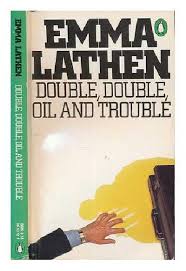The Award for Best Old Friends Return is a tie this year! [Gasp!]
The judge in his wisdom could not distinguish between two returns. And what a two they are!
They are the pseudonymous Emma Lathen and the singular Michael Dibdin. The works of both are discussed elsewhere on this blog.

Lathen was two businesswomen Mary Jane Latsis and Martha Henissart who wrote thirty or more novels together while maintaining their incognito working at day jobs. Their krimis are delightful. The books they produce are set in the world of high finance. The touch is light. The narrative is informative. Check the Wikipedia entry for more information.
It is surprising to see how few awards their books won. Perhaps they preferred to conceal their identities and discouraged such recognition. I suppose there are ways and means to do that. Not only are their individual titles some of the most entertaining and informative I have read, but they sustained that impetus for thirty years.
None of their titles has ever been mangled into a film. Maybe that is just as well when I consider the film adaptations of other novels, where the screenwriter evidently did not read the book beyond the title.
Their privacy remains because I could not find any pictures of either on the web.

And now for someone completely different, Michael Dibdin who published eleven krimis set in Italy, following the career, and sometimes the life, of Inspector Aurelio Zen. Each title is set in a different part of the country as the square peg Zen is moved around as his superiors try to fit him into round holes here and there.
Their is a travelogue element to what are otherwise pretty grim studies of crime, corruption, venality, and resignation. Wherever Zen goes he eats and drinks the local menu and speaks the dialect and all of that adds detail. Often these apparent diversions are in fact integrated into the story with a deft hand.
Over the sequence Zen’s backstory comes out slowly. But at no time is it the centre of attention, nor does it detract from the front story. So many krimis I start to read spend many clumsy pages near the start establishing the character by an elaborate backstory, none of which is ever relevant again, often calculated to make the reader feel sorry for (not just identify with) the principal. (Then there are the LLBean and Ikea krimis in which every stick of furniture in every room and article of attire of every character is described though irrelevant to plot or character.)
Zen is a certain age and accepts his lot in life. He is not a snappy dresser. He does not drive an Italian stallion. His few lady friends are just that, few. The one concession to the stereotype of Italians is the ever present offstage of his mother. Oh, and he also smokes too much and drinks so much coffee that he could blast off to the Moon if he tried.
Some of his stories were made into a lavishly produced short series of three feature length films for televisions in 2011. They were reasonable facsimiles of the novels but made Zen much younger and emphasised sex in a way not found in the books which were much more focussed on Italian culture and its corruptions in the period.
There is a profile of this fine writer on Wikipedia and a list of his titles.
